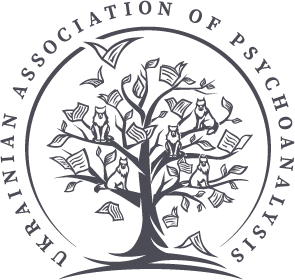Psychoanalysis is an individual path, unique for every person. However, one can find this path and use it only due to the strict framework of the psychoanalytic clinic.
In the modern world, psychoanalysis enables the subject to withstand the deadly effects of globalization processes in all spheres of life and activities, to survive in a consumer society, where the subject’s desires are negated. Following Freud, psychoanalysis can be called a path of truth, the truth of the subject. And in order to go this way, you need an appropriate psychoanalytic environment. That is why the UAP specialists adhere to the principles of psychoanalytic ethics and follow the rules of “three R”: Read, Research, Reinvent. To go this path is possible only if the psychoanalytic community follows the psychoanalytic principles which are laid down in the foundation of psychoanalytic practice.
Psychoanalysis is a time-proved, most complete system of knowledge about the underlying motives of human behavior and mental processes. Psychoanalytic work obliges psychoanalysts to develop themselves and to improve their knowledge throughout their lives. Therefore, we stand on the positions of quality psychoanalytic training and in-depth study of texts by Freud and his followers.
Psychoanalysis is a method of study that originated from the psychoanalytic clinic and is based on the psychoanalytic theory. However, the psychoanalytic method has moved far beyond the limits of psychotherapy; it is not limited to the clinic and is used in various fields of science, art and modern life as a whole. It is impossible to imagine modernity without psychoanalysis, which is implanted into many areas of human life.
Our Association as a community of psychoanalysts is based on the following principles:
- Psychoanalysis, in the first instance, is a special ethical position, which is to recognize the radical otherness of the other, to maintain the subject in his
uniqueness and singularity. And the analyst’s role is to search for the truth of the subject, to recognize his desire, but not to withdraw his disturbing symptoms or “to normalize him”.
- Psychoanalysis insists on the subject’s singularity in the raging sea of modern life. It is about the subject’s recognition of his way of being in a world which has nothing to do with common ideas. The subject of psychoanalysis is not a passive object of certain techniques. He is an active participant in the process.
- The subject of psychoanalysis is more than just a human being. Following Lacan’s thought, we mean the speaking subject, the split subject, the subject of the unconscious, the subject of relations.
- Clinic and theory are inseparable. We consider it necessary to return again and again to psychoanalytic theory in order to protect the basis of psychoanalytic thought from modern distorting and simplifying interpretations.
- To protect the boundaries of psychoanalysis from modern psychological, psychotherapeutic theories based on psychoanalytic thought. The ethics of psychoanalysis does not take the side of good or evil. Therefore, the desire of the analyst cannot be the desire to help, cure, correct, etc.
- Our activity is aimed at preserving psychoanalysis as a theory, practical method, and cultural phenomenon.
The Ukrainian Association of Psychoanalysis aims to institutionalize, avoiding the closeness, caste and sectarianism, which turn psychoanalysis into closed sacral knowledge, accessible only to a small group of people.
The Ukrainian Association of Psychoanalysis promotes the development and research on relevant psychotherapeutic, socio-psychological and socio-economic problems, conducts extensive public activities aimed at the development of psychoanalysis in Ukraine, and also implements a wide range of educational, research and social programs.
The mission of the Ukrainian Association of Psychoanalysis is the revival and development of psychoanalysis in Ukraine, creation of a professional community of psychoanalysts, development and dissemination of psychoanalytic and psychological culture and knowledge, psychological and psychoanalytic support to the people of Ukraine
In their practice, our specialists are guided by a special psychoanalytic ethic. This implies an individual approach and recognition of the uniqueness and peculiarities of each person. The work is carried out in strict confidentiality and involves partnership, responsibility and continuous development. The role of the psychoanalyst is to recognize the subject's “truth” and unconscious desire.
In the Ukrainian Association of Psychoanalysis we maintain an atmosphere of maximal co-operation, mutual support and development. For each person who asks for help, we find a specialist who meets the individual needs of the person to the maximum extent possible.
The Association makes sure that each of our specialists is constantly developing, so we organize various educational projects aimed at improving their qualifications, as well as supervisory and intervisory groups that help specialists in their daily work. We also offer projects which help the beginners to “enter” theirprofession.
The All-Ukrainian public organization “Ukrainian Association of Psychoanalysis” was established in 2002 with the view of reviving psychoanalysis in our country. This is a voluntary, independent public organization aimed at:
· the development and institualization of psychoanalysis in Ukraine;
· development and dissemination of psychoanalytic and psychological culture and knowledge in Ukraine;
· creation of a professional community of knowledge in the professional community of psychoanalysts;
· satisfaction and protection of legal social, economic, professional, creative, spiritual, age-specific and other general interests of its members.
PRESIDENT
Uvarova Svіtlana
VICE-PRESIDENT
BOARD
Uvarova Svitlana
Bondareva Svitlana
Vyshnevska Ella
Lastovets Nataliia
Martynenko Pavlo
Riabovol Maryna
Sozanovska Olena
Shkolenko Olha
Shpak Olena
EXECUTIVE SECRETARY
Vyshnevska Ella
CONTROL AND AUDIT COMMITTEE
Bondareva Svitlana
ETHICS COMMITTEE
Lastovets Nataliia
Shkolenko Olha
TRAINING COMMITTEE
Uvarova Svitlana
Soznovska Olena
Bondareva Svitlana
Chebotar Inna
Diakiv Iryna
Kozlova Iryna
Kutsenko Lesia
Lastovets Nataliia
Mylotvorska Viktoriia
Nosova Liubov
Piskunov Maxim
Tataryan lilit
Shkolenko Olha
Tarasiuk Nataliia
Tataryan Lilit
Vyshnevska Ella
CERTIFICATION COMMITTEE
Uvarova Svitlana
Chebotar Inna
Diakiv Iryna
Mylotvorska Viktoriia
Tatarian Lilit
MEMBERSHIP COMMITTEE
Shkolenko Olha
Lastovets Nataliia
Nosova Liubov
